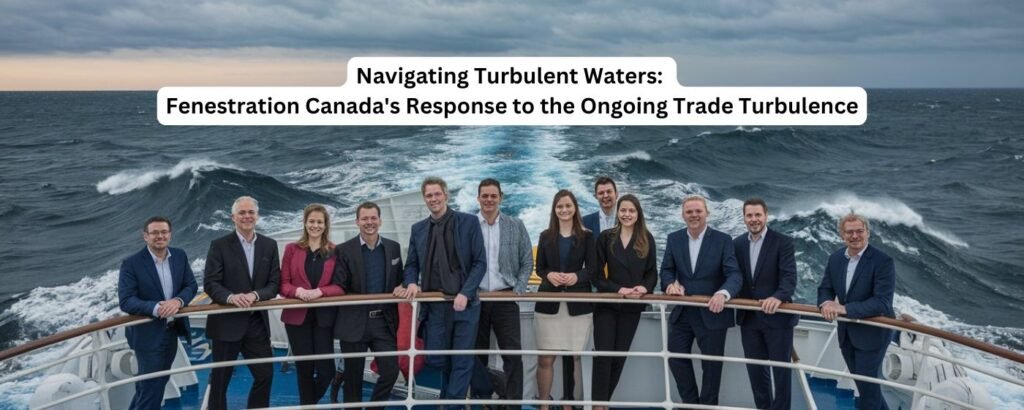
Navigating Turbulent Waters: Fenestration Canada’s Response to the Ongoing Trade Turbulence
The Interview Highlighting Tariffs and Its Impact on the Canadian Fenestration Industry
In a recent episode of Glass Talk, Pat Flannery engaged in a deep conversation with Adrian Edge, the Government and Regulatory Director at Fenestration Canada. The primary agenda revolved around the pressing issue of tariffs and the resultant potential trade war that could severely impact the Canadian fenestration industry. The dialogue was filled with insights on the current scenario, potential impacts, and actionable strategies to mitigate the looming crisis.
A Brief Pause Amidst the Storm
Adrian Edge opened the conversation by introducing an analogy he used previously, drawing parallels to a tense football game where a briefcase with switches was ready, but the button hadn’t yet been pressed. The Canadian government has implemented a temporary 30-day pause on tariffs, providing brief relief but leaving the industry on edge (pun intended) about what happens next.
Adrian pointed out the seriousness of potentially undergoing the most destructive trade war since the last century, highlighting a palpable tension between hope and cautious preparation. The lingering uncertainty isn’t ideal, but the industry must brace itself for all possible outcomes.
Preparing for the Worst, Hoping for the Best
Adrian discussed his interactions with around 15 manufacturers, focusing on their stances and strategies. Reflecting a mentor’s wisdom, he stressed planning for the worst while hoping for the best. He expressed that Trump’s unpredictable moves could have devastating effects not just now, but could also sow long-lasting damage to the Canada-U.S. trade relationship.
Deciphering Trump’s Objectives
Pat Flannery posed a vital question regarding Trump’s actual objectives behind the tariffs. Adrian provided a balanced view, acknowledging two opposing schools of thought: one portraying Trump as an opportunist chasing short-term gains and the other attributing a grand strategic motive to his actions.
Adrian speculated that there could be a calculated attempt to disrupt and exploit Canada’s resources, but emphasized the overwhelming challenge of accurately interpreting these actions.
Impact on the Fenestration Industry
Transitioning to the market-specific implications, Adrian highlighted a scenario where U.S. window and door products might become uncompetitive, paving the way for European and Chinese alternatives to fill the vacuum. This shift could have catastrophic effects on local manufacturers who wouldn’t be able to expand quickly enough, potentially leading to layoffs and company closures.
Strategic Response: Fenestration Canada’s Plan
To counter the adverse impacts, Fenestration Canada has devised a multi-faceted strategy focusing on four primary areas:
1. Safeguarding and Improving the Supply Chain
Ensuring critical items such as float glass remain untaxed is paramount. Certain resources are indispensable, and imposing tariffs on them could collapse the entire industry.
2. Enhancing Manufacturing Capability
Addressing space and labor issues tops the agenda. Manufacturing spaces in major cities are financially burdened, and without subsidies or incentives, expansion is stymied. Equally, labor shortages need innovative solutions to maintain and grow production.
3. Protecting Local Manufacturers
Implementing protections against unfair competition from subsidized offshore products is crucial. A Canadian-first policy for government-funded projects could provide the necessary boost, ensuring sustainable growth and fair competition within the industry.
4. Reducing Non-value Costs
Adrian pointed out the pressure of multiple regulations and standards that might not add value but inflate costs. Rationalizing these could provide much-needed relief, making compliance easier and less financially taxing.
Accelerating Efforts and Immediate Actions
Immediate actions from Fenestration Canada involve direct communication with the government, outlining essential items to remain untaxed. In parallel, they’ll work on providing manufacturers with guidelines on mitigating tax liabilities for products shipped to the U.S.
The Importance of Maintaining Solidarity
A vital message Adrian conveyed toward the end was ensuring a continued strong relationship with U.S. counterparts. The protectionist stance should not erode the historically supportive and collaborative cross-border relationship. Joint messaging and coordinated efforts are necessary, focusing on mutual benefits rather than adversarial competition.
Conclusion
The conversation between Pat Flannery and Adrian Edge sheds light on the monumental challenges and strategic responses shaping the Canadian fenestration industry’s future amid turbulent trade waters. Fenestration Canada remains committed to navigating these challenges, ensuring the industry’s resilience and long-term growth amidst impending uncertainties.
For those in the industry, it is a call to remain vigilant, proactive, and united as they brace for whatever may come next in this evolving trade landscape.

